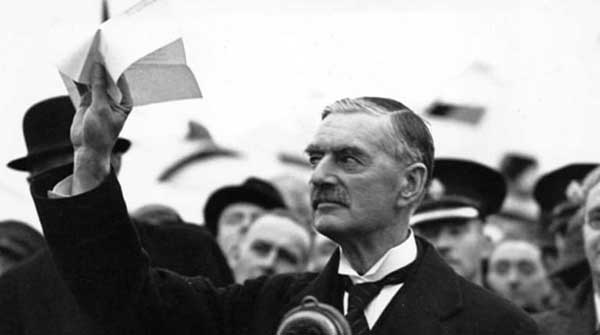An influential book from 1940 laid the guilt of appeasing Nazi Germany at the feet of 15 public figures
 While writing a column on Winston Churchill, I thought about the so-called Guilty Men, that being the title of a hugely influential polemic first published in the summer of 1940. The book’s thesis was simple: Britain’s dire straits could be laid at the door of 15 public figures deemed guilty of appeasing Nazi Germany in the 1930s.
While writing a column on Winston Churchill, I thought about the so-called Guilty Men, that being the title of a hugely influential polemic first published in the summer of 1940. The book’s thesis was simple: Britain’s dire straits could be laid at the door of 15 public figures deemed guilty of appeasing Nazi Germany in the 1930s.
Published pseudonymously, the book was the work of three authors, one of whom, Michael Foot, subsequently went on to become leader of the UK Labour Party. And it was a stunning success, running into multiple editions and purportedly shifting 200,000 copies within weeks of its release. Further, it set the tone for what was to become conventional wisdom.
The list of villains named in Guilty Men included two living former prime ministers – Stanley Baldwin and Neville Chamberlain. Although in his 72nd year, Chamberlain was still active, serving as a key member of Churchill’s cabinet. To put it mildly, neither man’s reputation was helped.
 |
| How empires grab and hold on to power
|
| The Canadian who helped tame America’s Wild West
|
| B.C. author takes a different approach to spirituality
|
Baldwin, a three-time prime minister, had been the dominant Tory figure in inter-war Britain. Adept at using new media like radio and cinema newsreels, he was politically very shrewd, and a man who believed in the values of compromise, consensus and inclusion. He was also indisputably patriotic, having anonymously contributed one-fifth of his fortune to paying down war debt in 1919. When he resigned the premiership in 1937, he went out at what appeared to be the top of his game.
Chamberlain’s tenure was a different matter entirely. After succeeding Baldwin, he soon found himself on a roller-coaster ride, trying desperately to keep the peace in Europe and to prevent Britain and Germany from going to war.
September 1938 was a particularly difficult month. Convinced that his personal diplomacy could make the difference, Chamberlain undertook three flying visits to Germany. And when he returned on the 30th with “peace for our time,” he received a tumultuous hero’s welcome. Czechoslovakia may have been carved-up for Hitler’s benefit, but it was a “quarrel in a far-away country between people of whom we know little.”
Of course, it all went pear-shaped in less than a year. Thanks to Hitler’s invasion of Poland, Britain was in a war in which things initially went very badly, and Chamberlain was replaced by Churchill in May 1940.
The knock against both Baldwin and Chamberlain was twofold. First, Britain had been too slow to rearm in response to German militarism. And second, there had been no effective resistance to Hitler’s aggressive moves, which only encouraged him to believe that he could keep pushing.
With the benefit of hindsight, it’s clear that the critics had a valid point. British policy in the 1930s failed. Churchill, then a dissenting backbencher, had a more realistic take on what was happening, and it would have been better if more people had listened to him.
However, the problem with hindsight is that it’s only available after the fact. Meanwhile, democracies move at their own pace and public opinion sets boundaries on what can be done. To be sure, effective leadership can have a big influence. But, absent an undeniable crisis or a general panic, public opinion can’t be moulded at will, particularly if the moulder wishes to take it in an unpalatable direction.
And in 1930s Britain, there were several reasons for resisting Churchill’s message.
For one, many thought that Hitler’s early moves weren’t entirely unreasonable. When, in defiance of the Treaty of Versailles, he remilitarized the Rhineland in March 1936, George Bernard Shaw dismissed it as being equivalent to Britain reoccupying Portsmouth.
For another, memories of the First World War were still fresh and nobody wanted a repeat. Instead, hopes were invested in general disarmament and peace under the auspices of the League of Nations.
The prospective terrors of air war were also a major source of anxiety. It was believed that the Luftwaffe would be able to launch massive immediate attacks on London, causing up to 150,000 casualties within the first week. Looking back from the vantage point of 1966, Harold Macmillan noted that “we thought of air warfare in 1938 rather as people think of nuclear warfare today.”
Baldwin and Chamberlain certainly got it wrong. But whether they were Guilty Men or merely mistaken ones, they had lots of company.
Pat Murphy casts a history buff’s eye at the goings-on in our world. Never cynical – well, perhaps a little bit.
For interview requests, click here.
The opinions expressed by our columnists and contributors are theirs alone and do not inherently or expressly reflect the views of our publication.
© Troy Media
Troy Media is an editorial content provider to media outlets and its own hosted community news outlets across Canada.


